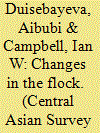|
|
|
Sort Order |
|
|
|
Items / Page
|
|
|
|
|
|
|
| Srl | Item |
| 1 |
ID:
191079


|
|
|
|
|
| Summary/Abstract |
By the end of the nineteenth century, the Russian Empire had significant economic potential. The dynamics of industrial growth influenced both territorial expansion and increased population, and the improvement of the transport system, which also contributed to the formation and development of industry. This process found its expression in the development of textile cloth production, which stimulated the growth of demand for wool and led to the development of commercial sheep-keeping. Sheep-keeping, which played a minor role on both peasant and private farms, became one of the most important economic interests of the empire. The tsarist government’s special interest in using the Kazakh steppes as a source of cheap raw materials for industry led Kazakh animal husbandry to gradually adapt to market requirements. Such changes ignored the fundamental role of traditional sheep-keeping in Kazakh culture and economic life. The loss of habitat and reduction of migration routes for Kazakhs, together with an increase in demand for livestock and livestock products, threatened the degradation of Kazakh sheep-keeping and the loss of a key element of culture.
|
|
|
|
|
|
|
|
|
|
|
|
|
|
|
|
| 2 |
ID:
131408


|
|
|
|
|
| Publication |
2014.
|
| Summary/Abstract |
The short-lived Emirate of Kashgaria was of strategic and commercial interest to both the Russian and British Empires. However, a close examination of the publications produced by the Russian and British missions to its ruler, Ya'qub Beg, militates against interpreting these missions as merely another episode of the Great Game, the century-long struggle for influence in Central and High Asia. Rather, Russian and British diplomats and travellers participated in a common culture of exploration, sharing a purpose and a European identity. This self-identification, in turn, was closely connected with the practice of exploration: objective measurement and scientific inquiry were coded as activities differentiating Russian and British travellers from the objects of their study. Although the information so gathered had political and strategic utility, the international networks and common values involved in its production established a network of mutual interests, respect, and cooperation even during moments of heightened geopolitical tension.
|
|
|
|
|
|
|
|
|
|
|
|
|
|
|
|
| 3 |
ID:
107542


|
|
|
|
|
| Publication |
2011.
|
| Summary/Abstract |
The Shcherbina Expedition of 1896-1903 was the Russian Empire's most concerted effort to gather the data necessary to facilitate peasant settlers' migration to its largely nomadic steppe oblasts. Although this expedition was a massive exercise of imperial power privileging sedentary over mobile pastoralist lifeways, the oppositional views of its participants made matters more ambiguous. The civilizational hierarchies that emerged in its materials did not strictly privilege sedentary lifeways, and an effort was made to preserve mobile pastoralists' lifeways and economic wellbeing. The project of objectively correct colonization that the expedition embodied was initially embraced by all interested parties as a certain solution to the clash of lifeways brought about by peasant migration to the steppe. After its work was published, however, contested use of its statistical norms made it clear that the idea of 'correct colonization' could not prevent the serious conflicts engendered by settlement in the steppe.
|
|
|
|
|
|
|
|
|
|
|
|
|
|
|
|
|
|
|
|
|